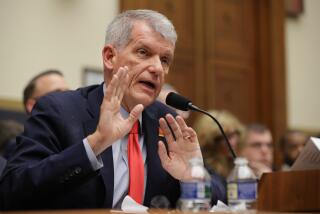Lincoln Parent Sues to Reverse Thrift’s Seizure
- Share via
American Continental Corp., making good on its promise to fight the federal seizure of Lincoln Savings & Loan Assn., has filed suit in U.S. District Court in Phoenix to overturn the seizure last Friday of the Irvine-based thrift.
The Federal Home Loan Bank Board, meanwhile, intends to ask a bankruptcy court today to transfer control of certain Lincoln assets to federal regulators, contending that American Continental filed for protection from creditors last Thursday to try to keep those assets out of the government’s hands.
Lincoln, one the of state’s biggest thrifts with $5.4 billion in assets, was seized by the bank board as part of the S&L; rescue program instituted by President Bush. While Lincoln still is owned by American Continental, it is being run by federal regulators.
Besides trying to overturn the seizure, the suit filed by American Continental seeks $150 million in damages from the bank board; its insurance arm, the Federal Savings and Loan Insurance Corp., and its regional regulatory branch, the Federal Home Loan Bank of San Francisco.
Federal Home Loan Bank Board Chairman M. Danny Wall said Tuesday he was aware of the suit but had not reviewed it and could not comment on its allegations. The suit was filed Monday.
Compelling Reasons
Wall said, however, that the bank board had compelling and legally proper reasons for taking control of Lincoln.
Government regulators maintain that Lincoln was being mismanaged and that its assets were being used to benefit American Continental at the expense of the S&L.;
“We said at the outset that we expect this to be a very litigious matter,” said Wall.
He said the seizure of Lincoln was hastened by American Continental’s decision to file for protection from creditors under Chapter 11 of the U.S. Bankruptcy Code on behalf of itself and 11 Lincoln subsidiaries. The bankruptcy case does not include the S&L.;
One result of the bankruptcy filing is the suspension of monthly interest payments to some 23,000 investors who bought $200 million worth of American Continental bonds.
Many of the bonds were sold through Lincoln’s 29 Southern California branch offices and were marketed as alternatives to certificates of deposit that paid lower interest rates but were protected by federal deposit insurance.
Under the bankruptcy rules, bondholders are considered unsecured creditors and cannot receive any payments of principal or interest until a plan of reorganization is worked out. One bankruptcy law specialist said that could take a year or more in a case as complex as American Continental’s.
Bond-Holder Action
One bond purchaser, Fountain Valley dentist Don Mikami, said Tuesday that bondholders are trying to determine what recourse they have.
“What we’re doing is organizing,” said Mikami, who owns $25,000 in American Continental subordinated debentures. “We’re collecting as many names as possible at this time and getting a data base of investors” for a possible future legal action.
In its suit, American Continental maintains that regulators had no right to assume control of Lincoln because the S&L; was solvent when it was seized.
The suit also claims that the bank board and its officials have waged a three-year campaign to destroy Lincoln “in retaliation for Lincoln’s opposition to limitations on the types of investments in which savings and loans may engage.”
American Continental Chairman Charles H. Keating Jr., in a 20-minute speech Monday, claimed that the seizure of Lincoln threatened the stability of American Continental--one of the Arizona’s largest employers--and thus was a blow against that state’s economy.
Keating also charged that the bank board has been attempting to destroy his reputation and the ability of his companies to do business by systematically leaking confidential information from government audits of Lincoln to the press and by “toying with the files, by trumped up charges . . . distortions and outright lies.”
Keating is a fiery and politically well-connected Phoenix developer who has been outspokenly critical of the bank board and its regulation of S&L; investing policies.
Times Staff Writer Maria L. La Ganga contributed to this report.
More to Read
Inside the business of entertainment
The Wide Shot brings you news, analysis and insights on everything from streaming wars to production — and what it all means for the future.
You may occasionally receive promotional content from the Los Angeles Times.










